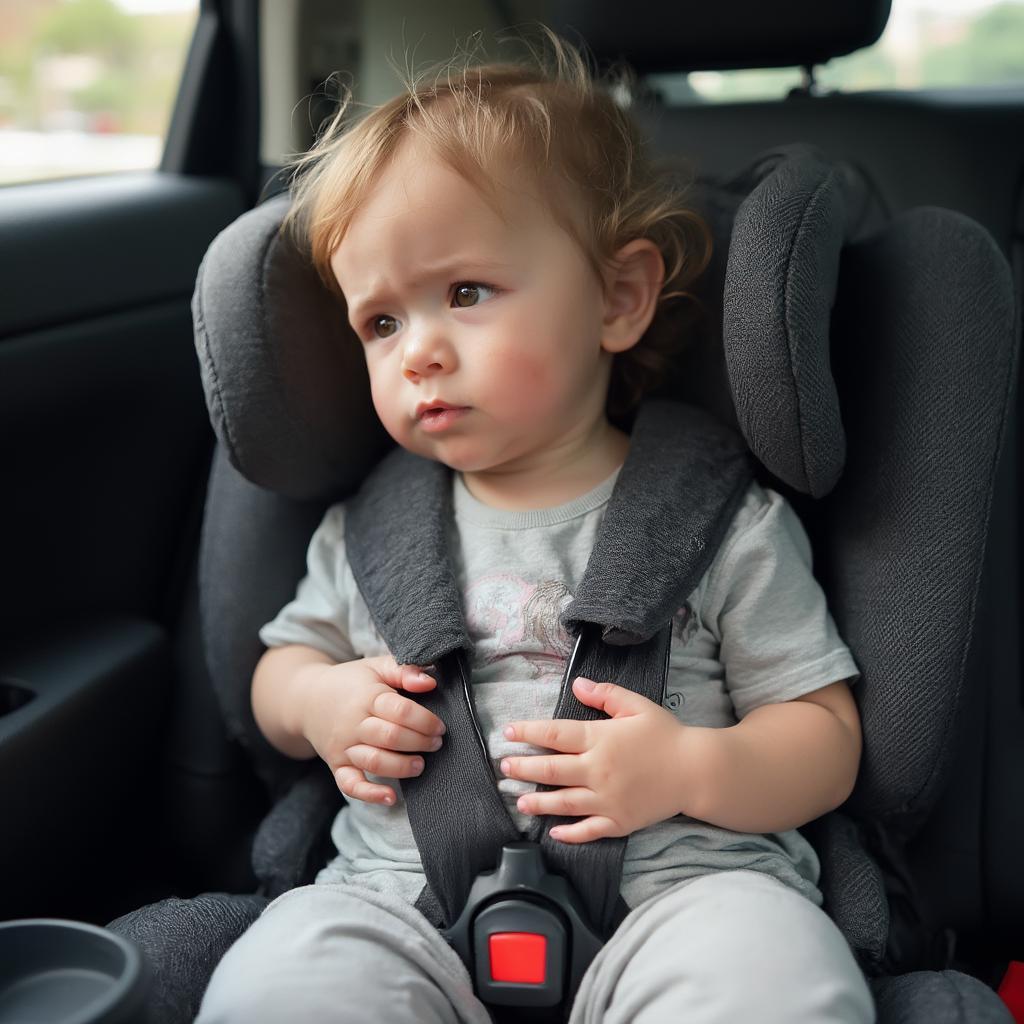Your cart is currently empty!

Toddler Car Sickness Tips: A Parent’s Guide to Smooth Journeys
Car sickness in toddlers is a common woe for parents, turning exciting road trips into stressful ordeals. Understanding the causes and implementing effective Toddler Car Sickness Tips can significantly improve your child’s travel experience. This guide provides practical strategies to combat car sickness and ensure smoother, happier journeys for the whole family.
Understanding Toddler Car Sickness
Car sickness, also known as motion sickness, occurs when the brain receives conflicting signals from the inner ear, eyes, and other sensory systems related to motion and spatial orientation.  A toddler feeling car sick in the backseat of a car. In a moving car, a toddler’s inner ear senses movement, but their eyes, focused on the inside of the car, may not register the same motion. This sensory mismatch can lead to nausea, vomiting, dizziness, and general discomfort.
A toddler feeling car sick in the backseat of a car. In a moving car, a toddler’s inner ear senses movement, but their eyes, focused on the inside of the car, may not register the same motion. This sensory mismatch can lead to nausea, vomiting, dizziness, and general discomfort.
Why Are Toddlers More Prone to Car Sickness?
Toddlers are particularly susceptible to car sickness because their inner ear structures are still developing. Their sensory systems are not yet fully mature, making them more vulnerable to sensory conflicts. Additionally, toddlers often have difficulty verbalizing their discomfort, making it challenging for parents to recognize the early signs of car sickness.
Effective Toddler Car Sickness Tips
Implementing these strategies can greatly reduce the likelihood and severity of car sickness in your toddler:
- Focus on the Horizon: Encourage your toddler to look out the window at distant objects. This helps align their visual input with the motion sensed by their inner ear.
- Fresh Air Circulation: Ensure adequate ventilation in the car. Open windows slightly or use the air conditioning to circulate fresh air.
 A family enjoying a road trip with the car windows open. Stuffy, warm air can exacerbate nausea.
A family enjoying a road trip with the car windows open. Stuffy, warm air can exacerbate nausea. - Frequent Breaks: Stop every hour or two for fresh air and a change of scenery. This allows your toddler to reset their sensory system and stretch their legs. tips for car trips with toddlers offer more advice on planning breaks.
- Light Meals: Avoid heavy, greasy, or strong-smelling foods before and during the journey. Opt for light snacks like crackers, fruits, or vegetables.
- Hydration: Encourage your child to sip water regularly, especially if they are feeling nauseous. Dehydration can worsen car sickness symptoms.
- Distraction Techniques: Engage your toddler in quiet activities like storytelling, singing songs, or listening to audiobooks. Avoid visually stimulating activities like reading or playing games on electronic devices.
- Over-the-Counter Remedies: Consult your pediatrician about age-appropriate motion sickness medications.
Choosing the Right Car Seat
A properly fitted car seat can also contribute to reducing car sickness. Ensure your toddler’s car seat is appropriate for their age and size and installed correctly. A comfortable and secure position can minimize movement and help alleviate discomfort. car travel tips for 2 year old provide further guidance on selecting the right car seat.
What to Do When Car Sickness Strikes
Despite your best efforts, car sickness can sometimes still occur. Be prepared with these tips:
- Pull Over Safely: If your child starts showing signs of car sickness, pull over as soon as it’s safe to do so.
- Fresh Air and Fluids: Offer your child sips of water and fresh air.
- Clean Up Supplies: Keep a clean-up kit handy with paper towels, wipes, and plastic bags.
- Comfort and Reassurance: Comfort and reassure your child. car travel tips with toddlers offer advice on managing challenging situations during car trips.
Conclusion
Toddler car sickness can be a challenging aspect of family travel. However, by understanding the causes and implementing effective toddler car sickness tips, you can significantly minimize its impact and ensure more enjoyable car journeys for everyone. kid car tips provides more general advice on car travel with children. Remember to consult your pediatrician if car sickness persists or becomes severe.
FAQ
- What are the common signs of car sickness in toddlers? Common signs include paleness, sweating, nausea, vomiting, dizziness, and drowsiness.
- At what age do children typically outgrow car sickness? Many children outgrow car sickness by adolescence, as their sensory systems mature.
- Can certain foods trigger car sickness? Yes, heavy, greasy, or strong-smelling foods can exacerbate car sickness.
- Are there any natural remedies for car sickness? Ginger and peppermint are believed to have some anti-nausea properties.
- Is it safe to give my toddler over-the-counter motion sickness medication? Always consult your pediatrician before giving your toddler any medication.
- Can car seat placement affect car sickness? Yes, placing the car seat where the child can see out the front windshield can help.
- What should I do if my toddler vomits in the car? Pull over safely, clean up the mess, and offer your child sips of water and fresh air.
 A happy toddler looking out the car window.
A happy toddler looking out the car window.
Other Car Travel Tips
Check out our other articles for more helpful advice on traveling with children: car travel 3 kids tips. We cover topics like packing essentials, entertainment ideas, and managing sibling squabbles on the road.
Need more personalized assistance? Contact us via WhatsApp: +1(641)206-8880, Email: [email protected] or visit us at 456 Pine Avenue, Toronto, ON M5V 2J4, Canada. Our customer service team is available 24/7.

Leave a Reply